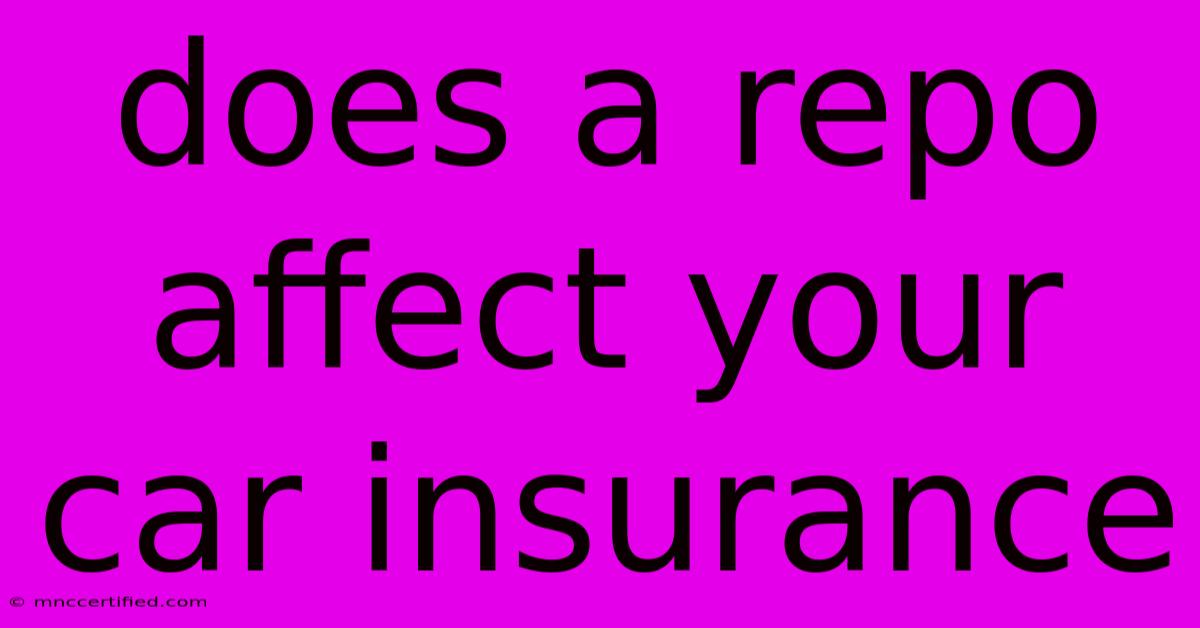Does A Repo Affect Your Car Insurance

Table of Contents
Does a Repo Affect Your Car Insurance? The Impact of Repossession on Premiums
Having your car repossessed can be a stressful and financially damaging experience. But what happens to your car insurance after the repossession? Does it affect your premiums, and if so, how? Let's delve into the relationship between repossession and car insurance.
The Impact of Repossession on Car Insurance Premiums
In short, yes, a repossession can significantly affect your car insurance premiums. Insurance companies view repossession as a red flag, indicating a higher risk of future claims. Here's why:
- Financial Responsibility: Repossession suggests a lack of financial responsibility, making you more likely to default on your insurance payments as well.
- Driving Habits: Some insurers may associate repossession with reckless driving habits, increasing the risk of accidents and claims.
- Limited Access to Vehicles: Without a car, you may be more likely to rely on public transportation or ride-sharing services, leading to potential accidents involving other drivers.
How Repossession Affects Your Insurance:
- Higher Premiums: Expect to see a considerable increase in your insurance premiums. Insurers may categorize you as a higher-risk driver, leading to significantly higher monthly payments.
- Cancellation or Non-Renewal: Some insurers may choose to cancel your policy altogether or refuse to renew it after a repossession.
- Difficulty Getting New Coverage: Finding new insurance coverage might be challenging, as insurers will likely view your repossession history with caution. You might face higher rates and limited options.
What to Do After a Repossession:
- Be Transparent: When applying for new insurance, be upfront about the repossession. Hiding this information will only hurt you in the long run.
- Improve Your Credit: Repairing your credit score demonstrates financial responsibility, which can improve your chances of getting better rates.
- Consider Alternative Insurance Options: Explore options like non-standard insurance companies that specialize in high-risk drivers.
- Shop Around: Compare quotes from multiple insurance providers to find the best rates possible, even if your options are limited.
Avoiding Repossession and Its Impact:
- Stay On Top of Payments: Make car payments on time, even if it means adjusting your budget.
- Maintain Good Credit: Good credit can help you secure more favorable loan terms and make you a more desirable customer to insurers.
- Communicate With Your Lender: Reach out to your lender if you're facing financial difficulties to explore potential solutions before a repossession occurs.
Conclusion:
Repossession has a significant negative impact on your car insurance. It can lead to higher premiums, difficulty finding new coverage, and even policy cancellations. The best approach is to avoid repossession by maintaining financial responsibility and taking steps to improve your credit score. If a repossession occurs, be open and honest with insurers to find the most suitable coverage options available to you.

Thank you for visiting our website wich cover about Does A Repo Affect Your Car Insurance. We hope the information provided has been useful to you. Feel free to contact us if you have any questions or need further assistance. See you next time and dont miss to bookmark.
Featured Posts
-
Tony Todd From Candyman To Icon
Nov 10, 2024
-
Arcane Season 2 New Episodes Coming To Netflix
Nov 10, 2024
-
Meghan And Harry Wedding Guest Cant Believe I Missed It
Nov 10, 2024
-
Upsc Quiz October 27 November 2 2024 Current Events
Nov 10, 2024
-
Mc Clean Separates During Wrexham Team Photo
Nov 10, 2024